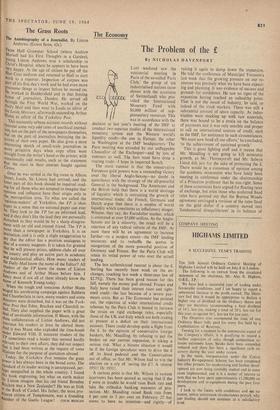The Grass Roots
FROM Hull Grammar School (where Andrew Marvell had his First Thoughts in a Garden), Young Linton Andrews won a scholarship to Christ's Hospital, where he appears to have been very happy. At the age of sixteen he put off the Blue Coat uniform and returned to Hull to start Work as a reporter. Inspection of corpses was Part of his first day's work and he had even more gruesome things to inspect before he moved on. He worked in Huddersfield and in that forcing house of journalists, Dundee. He served all through the First World War, worked on the Daily Mail and then went to Leeds as editor of the Leeds Mercury, afterwards succeeding Arthur Mann as editor of the Yorkshire Post.
This eminently urbane account records without rancour some very odd cases of unethical journal- ism, not on the part of the newspapers themselves, but on the part of journalists betraying the in- terests of their own paper. He also gives a most interesting sketch of small-scale journalism in More primitive days when copy often went straight from the writer's hand to the printer, with occasionally odd results, such as the statement that the stars in their courses fought against Cicero.
Once he was settled in, the big room in Albion Street, Leeds, Sir Linton had arrived, and the latter part of this book should be required read- ing for all those who are tempted to imagine that opinion and influence have their origin only in the metropolitan area. To what are called the opinion-makers' of Yorkshire, the YP is their paper in a sense that no national paper can ever. be. They look to the YP for an informed lead, and if they don't like the lead they are personally disturbed as they would be by a sharp disagree- ment with an old and trusted friend. The YP is More than a newspaper in Yorkshire. It is an institution, and it is only a slight exaggeration to saY that the editor has a position analagous to that of a county magnate. It is taken for granted that he will present prizes, address clubs all over the county and play an active part in academic and ecclesiastical affairs. How many readers of the Daily Mail know the name of the Editor? All readers of the YP knew the name of Linton Andrews and of Arthur Mann before him. I fancy most if not all of them already know the name of Kenneth Young today. When the tough and tenacious Arthur Mann Waged his unrelenting campaign against Baldwin and Chamberlain in turn, many readers and some directors were disturbed, but it was on the York- !hire Post that Eden, Bracken and Churchill re- lied. They also supplied the paper with a great deal of invaluable information. If Mann, with the close collaboration of Linton Andrews, did not convince his readers at least he alerted them. And it was Mann who exploded the time-bomb Under Edward VIII. If innocent readers of the Yp sometimes read a leader that seemed hardly relevant to their own affairs, they did not suspect Minister it had been written at the request of some ivlinister for the purpose of quotation abroad. Today, the Yorkshire Post remains the great Power it has always been in the broad acres. The !tandard of its leader writing is unsurpassed, per- haps unequalled in the whole country. I found r book engrossing, but what on earth makes Sir Linton imagine that his old friend Brendan ntacken was a New Zealander? He was as Irish as the Rock of Cashel. His father, the most pro- alinent citizen of Templemore, was a founding member of the Gaelic League! COLM BROGAN






























 Previous page
Previous page